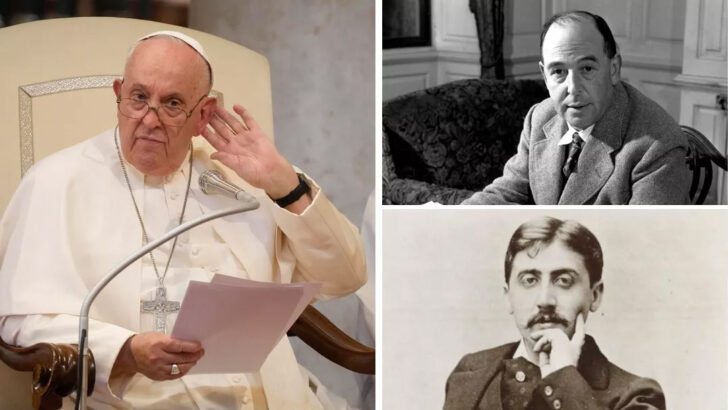Viva la Poesia!,
edited by Antonio Spadaro SJ
(Edizioni Ares Rome, €18.50); an English language version for the international market is due soon.
While the Pope was recovering during his recent stay in hospital yet another new book bearing his name appeared in the book shops of Rome.
Entitled Long Live Poetry! it focuses on Pope Francis’s lifelong love of poetry and its importance in the lives of all of us.
The contents, all from the pen of Pope Francis over the last decade or so, but have been assembled by a Jesuit associate, focus on the Pope’s engagement with poetry, poetry of all kinds and eras, and its deep influence on his thought and expression.
This aspect of his life derives from his childhood in Argentina, when, as he recalls, his Italian-born father would read the classics of his native land to the family in the evenings.
Heritage
The Pope’s experience of the mixed culture of Argentina and Italy have given him access to a rich literary heritage.
In introducing the book to the world on its publication, Cardinal Fernández, the Prefect of the Dicastery for the Doctrine of the Faith, observed that such expressions go beyond doctrinal explanation.
“There are certain truths that can only be communicated poetically, never without poetry.”
The book, Viva la Poesia!, released in Italian on March 21. surveys his reflections on poetry, literature and the human imagination.
It has been edited by a Jesuit, Fr Antonio Spadaro, an undersecretary of the Dicastery for Culture and Education. The book includes excerpts from major papal texts, letters and speeches.
“We must recover the taste for literature not only in our lives, but also in formation of our minds and spirit, otherwise we are like a dried fruit,” Pope Francis wrote in a document intended for the Curia in Rome, which is included in the book.
“Poetry helps all of us to be human beings, and we are in such great need of that today, ” he says. “I like poetry a lot… Poetry is full of metaphors. Understanding metaphors helps to make thought agile, intuitive, flexible, acute. Those who have imagination do not become inflexible, they have a sense of humour, they always enjoy the sweetness of mercy and inner freedom”
In his apostolic exhortations, encyclicals and speeches he has often used poetry”
According to the editor the book provides the definitive keys to understanding the Pontiff’s literary intelligence, outlining the vast panorama of authors that punctuated his formation, from Dante to Dostoevsky, from Virgil to Borges, passing through Hölderlin, Tolkien and many others.
The young Jorge Mario Bergoglio was a teacher of literature. The book concludes with an illuminating interview with one of the literature students from the high school where taught when he was a scholastic. He must have been inspiring.
Many who have passed through a Jesuit education owe a great debt to those individual Jesuits teachers who introduced them warmly to the benefits of a true humanism.
The editor Fr Antonio Spadaro himself reflects on the Pope literary aptitudes. “He has always had this interest in poetry, even as a pontiff. In his apostolic exhortations, encyclicals and speeches he has often used poetry. I would say that he has expressed his theological contents through poetic language.
“When I interviewed Pope Francis in 2013, in the first interview, he said very clearly that the Church needs ingenuity. And so turning to poets today means asking, almost knocking on the door of poets and artists to help the Church be genial in these difficult times.
“I think that an important speech is that of Francis to the Popular Movements,” his editor concluded. “Because in that speech he speaks of those who work for the common good as ‘social poets’. . .
Creative
“He uses the word ‘poet’ because the poet is creative. Therefore, the creativity of poetry is not limited to literature, but is part of the ordinary life of those who serve the community. Creativity is necessary.”
At the end of the day, Pope Francis pointed out to his editor, poetry helps everyone to become more human. “In this age of artificial intelligence we cannot forget that poetry and love are necessary to save our humanity.


 Peter Costello
Peter Costello Pope Francis has an ear always alert to the voices of poetry and literature.
Pope Francis has an ear always alert to the voices of poetry and literature. 